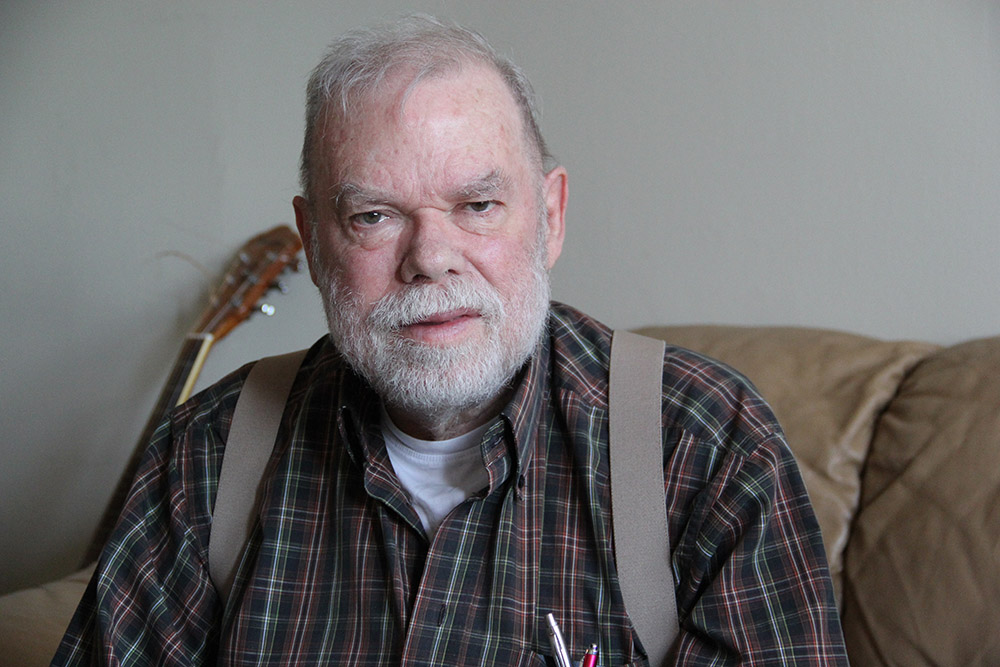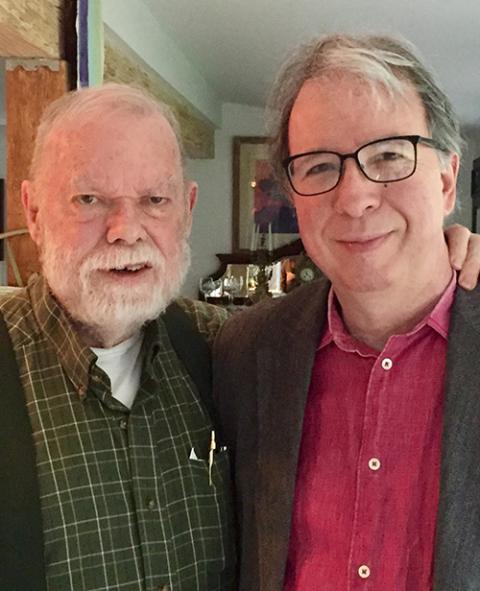
Jim Forest (Robert Ellsberg)
In 1966, Jim Forest, then 24, received what he later called the most important letter of his life. It was from the great Trappist monk Thomas Merton, whom he had befriended some years before while serving as managing editor of The Catholic Worker. At that time, Forest had been pondering a possible monastic vocation, but Merton — who was then "coming out" as a prophetic voice for peace and nonviolence — had advised him that his true calling was in the peace movement.
Jim had heeded that counsel, going on to co-found the Catholic Peace Fellowship, trying to arouse opposition to the war in Vietnam. But now, as the war continued to escalate, he was feeling increasingly hopeless. Who was listening to the voice of peacemakers? What difference were their efforts making?
In a long reply, Merton wrote, "Do not depend on the hope of results. When you are doing the sort of work you have taken on, essentially an apostolic work, you may have to face the fact that your work will be apparently worthless and even achieve no results at all." Merton counseled Jim about investing in slogans, or in building an identity in his witness as a way of protecting himself from nothingness.
"The real hope," Merton wrote, "is not in something we think we can do, but in God who is making something good out of it in some way we cannot see."
Jim took those words to heart. They set him on a life of extraordinary dedication to the Gospel call of peacemaking — which, as he came to understand, was more than simply being "anti-war." "In the end," Merton had noted, "it is the reality of personal relationships that saves everything."
In many obvious ways Jim's life was shaped by his personal relationships with many of the great peacemakers of our time, including Merton, Dorothy Day, Thich Nhat Hanh and Daniel Berrigan. In the end, he took in their gifts and lessons and paid them forward: not only in the biographies he would write about each of them, but in his role as a friend, mentor and spiritual companion to many others, including me.
Jim died on Jan. 13 at the age of 80 in his adopted home of Alkmaar, in the Netherlands. Since then, I have reflected on the deep and mysterious ways our journeys were intertwined. One sign of that came in 1976, when, as a young managing editor of The Catholic Worker, I published an edited version of Merton's letter to Jim under the title "Letter to a Young Activist." In that form and with that title it has become famous around the world — in fact, amazingly, the most oft-reprinted text of anything Merton ever wrote. (You can easily find it online.)
Advertisement
But our first encounter actually went back to 1972, when I was 16 and attending with my father an anti-war rally in Harrisburg, Pennsylvania. I remember how affected I was by the attention and encouragement Jim extended to me as a young person, setting out on my own journey. When I reminded him of this recently, he said, "How nice to know that one has been the kind of person one would like to be!"
But that kind of attention was a hallmark of Jim's approach to life. If peacemaking, ideally, involves making friends of enemies, for Jim it also meant making friends of strangers. So often I witnessed him display that same receptive openness to people he met while giving talks, or who lined up afterward for an autograph.
He took seriously the people who wrote him with personal or spiritual questions. Often, he would counsel them in words that echoed Merton. Answering someone who wrote, "I find myself losing faith in people of faith," he wrote, "Fortunately we do not have to have faith in people of faith — only in Jesus."
Our deep friendship began in earnest in 1974 when I traveled to Paris to seek out Nhat Hanh, the Vietnamese monk and Zen master, who was living there in exile. As my interest was largely inspired by reading Jim's articles in Fellowship, it was an unexpected bonus that my visit there overlapped with Jim. During a side pilgrimage to Chartres cathedral, we began a conversation that would last for half a century.
A year later, inspired in part by Jim, I took a leave from college to join Day at the Catholic Worker. Not knowing exactly how one did this, I relied on Jim to place a call and see if there was an empty bed at St. Joseph House. (Providentially, there was.) And so I literally embarked from Jim's house to begin a sojourn of five years at what Jim liked to call "Dorothy Day University."
When Jim moved to Holland to serve as general secretary of the International Fellowship of Reconciliation, our friendship was sustained through his famously prolific skills as a letter writer. But we would meet whenever he returned to the States. On one of these occasions, we shared an experience that proved surprisingly fateful for Jim's subsequent life. That occurred when we went to the movies, and chose "Moscow Does Not Believe in Tears," an Oscar winner for best foreign film of the year.
For audiences used to seeing the Russian people entirely through a Cold War lens, the film offered a basic human story of three young Russian women, charting over the several decades their friendship, their hopes, joys, heartaches and search for love. Though Jim had spent decades promoting peace and reconciliation between opposing camps of the Cold War, he realized how very little he knew about the actual Russian people.
Inspired by this film, he undertook several trips, in which he was particularly moved by the resilient faith he witnessed. The eventual outcome was his decision, along with his wife, Nancy, to embrace the Russian Orthodox faith.

Jim Forest, left, and Robert Ellsberg (Courtesy of Robert Ellsberg)
Jim was always a prolific writer. (Scores of his essays on the spirituality of peacemaking can be found on his website: jimandnancyforest.com.) But with my arrival in 1987 as editor-in-chief at Orbis Books, Jim embarked on a new and incredibly fruitful phase of his writing life.
Over the years, we worked together on more than a dozen books, including a series of illustrated biographies: Living With Wisdom: A Life of Thomas Merton, All Is Grace: A Biography of Dorothy Day and At Play in the Lion's Den: A Biography and Memoir of Daniel Berrigan. He completed this series in his last year with Eyes of Compassion: Learning from Thich Nhat Hanh. (By a curious coincidence, Nhat Hanh's death at 95 would follow only days after Jim's.)
On the basis of this series alone, Jim would have made an incomparable contribution to future generations. But along the way he shared his own wisdom as a spiritual teacher in such books as Praying With Icons, The Ladder of the Beatitudes and Loving Our Enemies. In The Road to Emmaus, he wrote about living in the spirit of pilgrimage, "a way of living that opens to the unexpected encounter with Jesus in our daily life."
He elaborated on that theme in his own memoir, Writing Straight With Crooked Lines, which traced a story of "conversion in progress." That story was not just about the crooked line from the communist home of his childhood to his life as a Christian peacemaker, a chronicle marked by his encounters with remarkable figures, his time in prison for burning draft files with the Milwaukee 14, and his own "pilgrimage with illness." (After years on dialysis, he was rescued by Nancy's gift of a kidney.)
With honesty and compassion, he also recounted experiences of doubt, uncertainty, and failure, not least in certain relationships, before finding his soulmate, Nancy, his wife of 40 years.
My role as Jim's publisher incorporated so many threads of our common story. But there was so much more: our work together in promoting Dorothy Day's legacy; his countless visits to my home, where he came to know and befriend my children; his encouragement to my own writing life about saints. And then: the constant prayers and messages as he accompanied me through times of the greatest joy as well as long dark nights. Indeed, as he proved, it is truly the reality of personal relationships that saves everything.
Fortunately, as Jim said, we don't have to put our faith in "people of faith." But Jim's faithfulness, his humanity, his capacity for wonder and delight, his laughter and tears, his knowing when to speak and when to be silent, have strengthened the faith of many.
Sometimes, Jim seemed to doubt the importance of his own witness, wondering if his own life was just a pale imitation of the figures he so admired. One evening, he told me that he sometimes thought of all his great mentors, regretting that he couldn't match Merton's capacity for contemplation, or Nhat Hanh's mindfulness, or Day's spirit of hospitality, or Berrigan's courageous witness. I said, "If they could only see how much you have repaid their love for you!"
There is not room in a lifetime for many friendships that last 50 years. One is blessed to have even one. But I carry from Jim not only his love, but seeds that were planted in him by so many other teachers and mentors along the way. I can only try to be as faithful as Jim in tending those seeds and passing them on.








